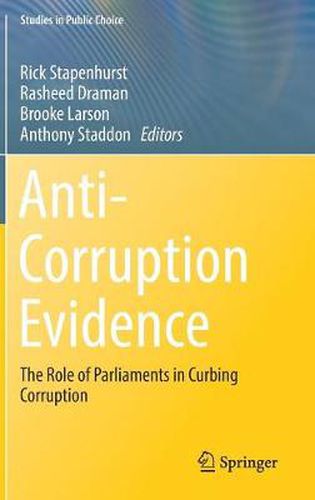Readings Newsletter
Become a Readings Member to make your shopping experience even easier.
Sign in or sign up for free!
You’re not far away from qualifying for FREE standard shipping within Australia
You’ve qualified for FREE standard shipping within Australia
The cart is loading…






This title is printed to order. This book may have been self-published. If so, we cannot guarantee the quality of the content. In the main most books will have gone through the editing process however some may not. We therefore suggest that you be aware of this before ordering this book. If in doubt check either the author or publisher’s details as we are unable to accept any returns unless they are faulty. Please contact us if you have any questions.
This book discusses parliamentary oversight and its role in curbing corruption in developing countries. Over the past decade, a growing body of research at the global and regional levels has demonstrated that parliamentary oversight is an important determinant of corruption and that effective oversight of public expenditure is an essential component of national anti-corruption strategies and programs. However, little research has been undertaken at the country level regarding how parliamentary oversight is undertaken, which oversight mechanisms are effective or on how national parliaments interact with other anti-corruption stakeholders. This book presents the results of a new large-scale, quantitative analysis which identifies the mechanisms through which institutional arrangements impact corruption, specifically through country case studies on the Caribbean region, Ghana, Myanmar, Nigeria, Tanzania, and Uganda. Addressing a gap in scholarly knowledge while presenting practical policy advice for parliaments and for anti-corruption assistance agencies, this book will be of use to scholars interested in development, anti-corruption, public finance, as well as members of parliament, anti-corruption practitioners, and organizations working in parliamentary strengthening.
$9.00 standard shipping within Australia
FREE standard shipping within Australia for orders over $100.00
Express & International shipping calculated at checkout
This title is printed to order. This book may have been self-published. If so, we cannot guarantee the quality of the content. In the main most books will have gone through the editing process however some may not. We therefore suggest that you be aware of this before ordering this book. If in doubt check either the author or publisher’s details as we are unable to accept any returns unless they are faulty. Please contact us if you have any questions.
This book discusses parliamentary oversight and its role in curbing corruption in developing countries. Over the past decade, a growing body of research at the global and regional levels has demonstrated that parliamentary oversight is an important determinant of corruption and that effective oversight of public expenditure is an essential component of national anti-corruption strategies and programs. However, little research has been undertaken at the country level regarding how parliamentary oversight is undertaken, which oversight mechanisms are effective or on how national parliaments interact with other anti-corruption stakeholders. This book presents the results of a new large-scale, quantitative analysis which identifies the mechanisms through which institutional arrangements impact corruption, specifically through country case studies on the Caribbean region, Ghana, Myanmar, Nigeria, Tanzania, and Uganda. Addressing a gap in scholarly knowledge while presenting practical policy advice for parliaments and for anti-corruption assistance agencies, this book will be of use to scholars interested in development, anti-corruption, public finance, as well as members of parliament, anti-corruption practitioners, and organizations working in parliamentary strengthening.